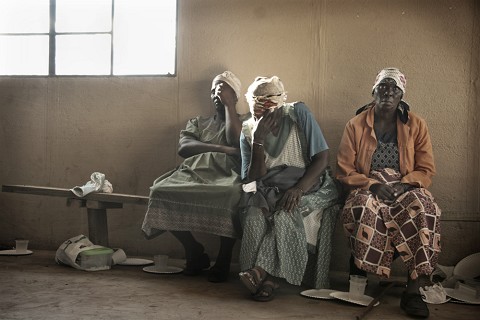Coping with pain upon pain

Nsoko, Swaziland is the most pain-filled place on earth I know. In a country where 45% of adults have the HIV virus, the people of Nsoko have an infection rate that, astonishingly, is twice that – 90%. Visit their homes and you can’t help but encounter the pain. Skeletal women with hollow eyes wa…
By Seth Barnes
 Nsoko, Swaziland is the most pain-filled place on earth I know. In a country where 45% of adults have the HIV virus, the people of Nsoko have an infection rate that, astonishingly, is twice that – 90%. Visit their homes and you can’t help but encounter the pain. Skeletal women with hollow eyes wasting away in corners. Frightened children left to cope by themselves. And our people, Pastor Gift and Philile are right in the middle of it. Every day they’re comforting someone, burying someone, taking someone to the hospital. They touch and consecrate the remorseless pain of their neighbors.
Nsoko, Swaziland is the most pain-filled place on earth I know. In a country where 45% of adults have the HIV virus, the people of Nsoko have an infection rate that, astonishingly, is twice that – 90%. Visit their homes and you can’t help but encounter the pain. Skeletal women with hollow eyes wasting away in corners. Frightened children left to cope by themselves. And our people, Pastor Gift and Philile are right in the middle of it. Every day they’re comforting someone, burying someone, taking someone to the hospital. They touch and consecrate the remorseless pain of their neighbors.
Last night I received a message from Pastor Gift that a windstorm had blown through and crumpled the roof of our community center and had demolished many homes (report here). It leaves you shaking your head and asking, “How much more can a person take?”
All of us experience pain. Pain as a one-off at worst results in post-traumatic shock syndrome. It’s the repeated pain – the pain upon pain that is senseless or abusive – that dulls the senses and sends us scuttling for safe places. We have no words for it. At a minimum it seems unfair. With Job we shake an angry fist at the God who set this whole thing up. We ask “why?” and our voice echoes unanswered off the walls.
I know a family that this year said goodbye to their father, a victim of cancer. Left behind are a mother and daughter also battling with cancer, while the other two daughters cope with devastating pain of their own. Pain upon pain. It’s more than anyone should bear. What do we say in the face of such monstrous realities?
Some of you know what I mean. You’ve had your fill and the cup of your pain is running over. It’s a thundering migraine that won’t go away, a thumb in your eye when you’re already beat down and gasping for breath. You’ve lost your job and suffer the humiliation of getting turned down for the hundredth time. Many of us know couples who, having lost their child then find that the pain of the loss causes them to lose their marriage.
Horatio Spafford’s life gives us perhaps the best answer to this question of pain upon pain. He lost his son to an early death, his business in the Chicago fire, and all four of his daughters drowned when a ship went down. Later, passing by that spot, he wrote the famous hymn “It is Well With My Soul.” But that’s not the end of the story. Later, he and his wife moved to Jerusalem and founded a ministry to the poor. The ministry later became the subject of a Nobel Prize-winning book.
I remember one of the last times I was in Nsoko sitting in the dirt with a Swazi woman who had lost her whole family. We visited the graves of her family members and sang “It is Well With My Soul” with her. And in sharing her grief, we honored it, for a moment transforming it to something holy – a sacrifice to a God who, despite appearances to the contrary, still cared, shining hope into a place sandblasted by pain.
 What else can we who follow Jesus do except that – join our brothers and sisters in their distress and honor the pain that has no explanation and the God who won’t give one? It is the response of Jesus’ disciples to his death and it is the sacred pathway God still gives us to journey. In Nsoko this morning, that is what Pastor Gift and his staff will be doing. Half a world away, we can join him through our prayers and through our giving. Some of us may even hum Horatio’s Spafford’s hymn as a way of consecrating this awful fight to bring light into the darkness.
What else can we who follow Jesus do except that – join our brothers and sisters in their distress and honor the pain that has no explanation and the God who won’t give one? It is the response of Jesus’ disciples to his death and it is the sacred pathway God still gives us to journey. In Nsoko this morning, that is what Pastor Gift and his staff will be doing. Half a world away, we can join him through our prayers and through our giving. Some of us may even hum Horatio’s Spafford’s hymn as a way of consecrating this awful fight to bring light into the darkness.*See Teri’s comment below: Steven Curtis Chapman knows the pain of losing a daughter. Here’s his take on Spafford’s theme. It’s profound, matching music to his private pain.



Thanks for not trying to solve it, Seth. Pain like this can’t be solved, or quantified, or tied up in some neat bow of theology. It is time like that when all that can be done is to cry out in song.
I was blessed greatly this week by the new song by Steven Curtis Chapman, called “Heaven Is the Face”. It’s his heart’s cry to God over his pain of losing his little girl.
I pray God would give Heaven a face for the pain. No answers, just a face to sing to… It is well…
wow. praying for swazi and Pastor Gift and Philile. Selfishly, I miss them.
Another “have to share” post, Seth! This one will be going on my blog and I’ll be sharing it thru fb, too. Hopefully we get a lot of prayer AND financial support for the folks in Nsoko.
Can’t wait to be there next year!
Elysa Mac
Spafford’s hymn has ministered to many a soul … I remember a friend whose son committed suicide. This song was the anthem God gave her as she healed from such a devastating loss and all the unanswered questions. Few of us can even begin to know the pain and loss those in Nsoko must deal with everyday. Wreck us, O Lord, for others…
The need to understand suffering betrays the fallacy of our (my) thinking. There is much that can’t be understood. That’s why faith is foundational to everything.
Life is a “wrecking ball” as it is.
And the numbing pain of places like Nsoko is beyond imagination.
Heaven will validate the spiritual heroes.